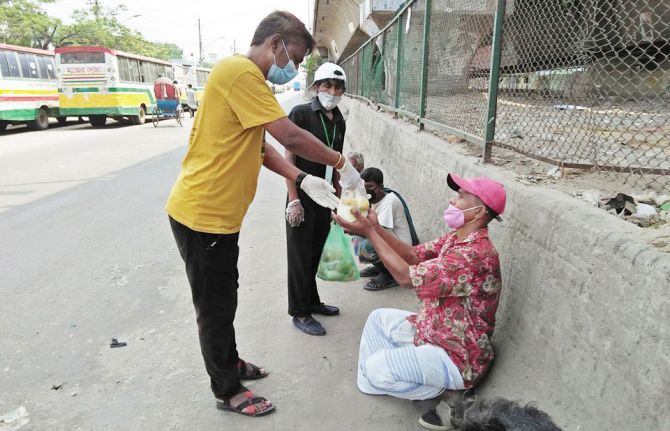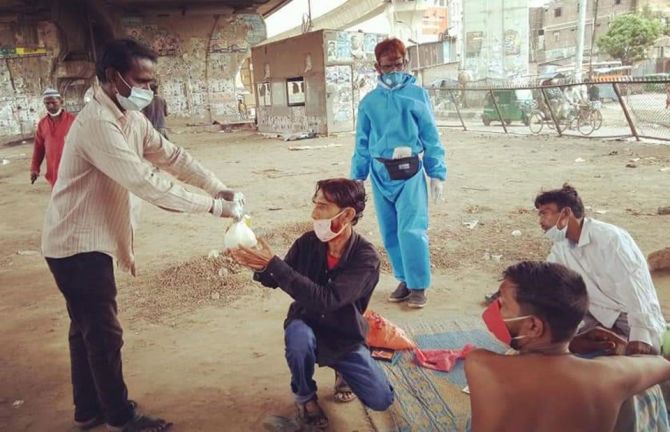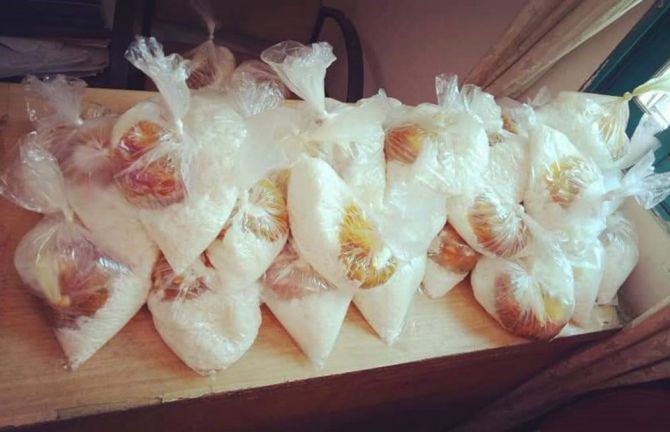



Feature Story
Cash donations for people who use drugs during COVID-19 in Bangladesh
09 September 2020
09 September 2020 09 September 2020“I cannot provide my family with sufficient food as my earnings have gone down. I feel depressed seeing my family going through economic pain and hunger,” says Kamal Hossain (not his real name), a person who uses drugs who lives in Dhaka, Bangladesh.
The COVID-19 pandemic is affecting the lives and livelihoods of people everywhere. The impact is especially being felt by people who are socioeconomically disadvantaged or marginalized. In Bangladesh, for people who use drugs and who are already struggling with disenfranchisement from the wider community, the hardships they face in making a living and accessing social protection schemes have been exacerbated.
Some of Mr Hossain’s peers worked before the pandemic, but they lost their jobs during the lockdown. Recreation facilities and drop-in-centres where previously they received health and psychosocial support were either closed or only partially operational, and clinical services were disrupted.
To support people who use drugs during the lockdown, UNAIDS made a donation to the Network of People Who Use Drugs (NPUD). With the donation, NPUD provided meals and clothing during the Eid ul-Fitr festival to people who inject drugs and who are living on the street. Food was distributed by members of the local community. For some, this was the only support they had received during the COVID-19 pandemic.
“I received only one meal during the lockdown. I did not receive any government support as I do not have a national identity card. I also received a mask and soap from a civil society organization,” said Rafiq Uddin (not his real name), who is homeless and uses drugs in Dhaka.
Community-based organizations are struggling to support the livelihoods of people from the populations most at risk, including people who use drugs.
“Since NPUD is an organization of people who use drugs, we cannot stay away from this crisis. In this time of difficulty, some leaders of NPUD have come forward to help and UNAIDS’ support has made the first step to make a difference,” said Shahed Ibne Obaed, the President of NPUD.
After receiving the donation from UNAIDS, NPUD reached out to other partners, including CARE Bangladesh, Save the Children (Bangladesh), local humanitarian agencies and volunteer organizations, to provide more comprehensive food support.
“I received some cash from a volunteer organization in my locality. Some of my relatives and well-wishers helped me with food. I also tried to do some income-generating work to support my family, but it was not available on a regular basis,” said Mr Hossain, who is a member of Ashakta Punarbashan Sangstha (APOSH), a community-based organization in Dhaka.
NPUD mobilized enough resources from various sources to continue to support people who inject drugs and people living with HIV in the older parts of Dhaka and beyond. Around 1600 people who use drugs have benefited from the initiative. Coordination between NPUD and other community-based organizations helped to identify beneficiaries. Outreach workers from drop-in centres, APOSH, Prochesta, Old Dhaka Plus, Alor Pothe and others helped to distribute food and clothes. Members of community-based organizations offered their homes as places to prepare and pack food.
NPUD procured personal protective equipment for outreach workers and masks and soap for beneficiaries and set up an online group to share updates and pictures and give information about their activities. The whole initiative was fully voluntary.
“A major concern is the shortage of human and financial resources to support all vulnerable people who use drugs. Wider donor involvement is necessary to generate more funds to support them, especially those who are living on the street, and to ensure sustainability of this initiative,” said Saima Khan, UNAIDS Country Manager in Bangladesh.



